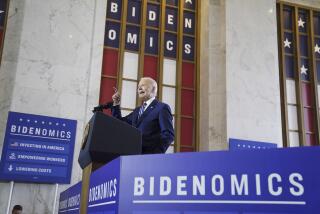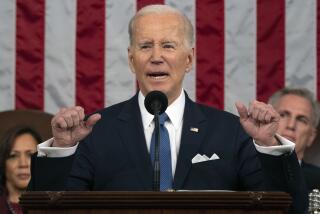{NEWS ANALYSIS} {Obama moves to regain ground after {lsquo}self-induced injury’ }
- Share via
WASHINGTON — In only his second week in office, Barack Obama is punching the restart button on his presidency.
On Tuesday, Day 14 of a tenure that began with high hopes and soaring promises of bringing a new competence to Washington, Obama essentially admitted that he had lost ground in confronting his biggest challenge -- fixing the country’s crippled economy -- due to the “self-inflicted injury” of naming appointees who had failed to pay their taxes.
He shed two of those appointees and then took to the airwaves -- conducting not one but five Oval Office network television interviews in which he sought to seize control over the economic stimulus debate. Republicans have found traction on the issue by painting themselves as defenders of taxpayers and homeowners, while portraying Democrats as frivolous big spenders.
“I’m frustrated with myself, with our team,” Obama told NBC’s Brian Williams in a comment that was typical for his afternoon of televised mea culpas. “But ultimately my job is to get this thing back on track, because what we need to focus on is a deteriorating economy and getting people back to work.”
He told ABC’s Charles Gibson that he “can’t afford glitches.”
“Right now what I should be spending time talking to you about is how we’re going to put 3 to 4 million people back to work,” he said.
“This is a self-induced injury that I’m angry about,” he added, “and we’re going to make sure we get it fixed.”
To the network anchors he repeated a surprising mantra: “I screwed up.”
Obama’s language was striking in part because the man he replaced, George W. Bush, famously refused to admit error, at least until his final days in the White House.
For the new president, winning passage of a stimulus plan has become only more difficult in recent weeks. A surprisingly unified GOP has taken control of the debate -- and embarrassed Democrats -- by highlighting controversial expenditures in the $819-billion bill passed last week by the Democratic-led House, such as funding for contraceptives and for new sod for the National Mall.
Those items were stripped from the bill, but their presence in the debate put the White House on the defensive in pushing legislation that, not long ago, many Democrats had thought could be delivered to the new president within days, if not hours, of his taking office Jan. 20.
At the same time, U.S. banks have deteriorated further, raising the prospects that Obama will have to press not only for the stimulus but also for a second unpopular bank bailout.
Then came the disclosures that three of Obama’s highest-profile appointees had failed to pay some taxes, and that at least two senior officials were being granted exemptions from the new administration’s strict ethics policy banning lobbyists from getting jobs.
Two of the tax-plagued appointees, including would-be Health and Human Services Secretary Tom Daschle, a key Obama advisor, withdrew their names Tuesday, hoping to end what the president called a “distraction.”
The third, Treasury Secretary Timothy F. Geithner, remains in office. Whether Geithner’s problems will fade over time or remain a focus of public attention is not yet clear.
The tax problems were damaging Obama’s arguments in the stimulus debate -- and were potentially damaging to his ability to push for other difficult legislation, including the healthcare reforms that Daschle was to shepherd through Congress. The White House was left open to attacks such as the one from a top GOP leader, Rep. Eric Cantor of Virginia, who said over the weekend that it was no wonder Democrats push for higher taxes “because, you know what, they don’t pay them.”
The events are not a defeat for Obama and his legislative priorities, but they do mark a significant reversal of fortune. Obama started building support for the stimulus weeks before he took office, and he came to the White House with a claim that he deserved wide latitude to change how politics are conducted -- a claim that he may no longer clearly hold.
White House spokesman Robert Gibbs conceded during his regular briefing Tuesday that “people have lost sight of what the legislation does.”
A Gallup survey released Tuesday showed the challenge facing Obama, and suggested that GOP attacks have had an effect. Whereas three-quarters of Americans surveyed said they supported passage of some version of the Obama-backed stimulus plan, only 38% said they thought Congress should pass it “basically as Barack Obama has proposed it.” About the same share, 37%, said it should be passed but only with “major changes.”
The same poll showed that Obama continued to enjoy approval ratings in the high 60s, and Tuesday’s events showed that he did not intend to squander that political capital.
It was evident Tuesday that the White House had concluded it was time to regain the upper hand. The stimulus debate was beginning in the Senate, where Democrats will need support from at least a few Republicans to avoid a filibuster.
“The Republicans have done a good job in recent days of fly-specking this bill,” conceded a Senate Democratic leadership aide, speaking on condition of anonymity because of the politically sensitive nature of the issue. “The easy part was getting it through the House,” where Democrats hold a majority that allowed them to approve the bill without Republican support. “But the Senate is much harder.”
Obama’s five interviews Tuesday gave him the chance to reach millions of Americans and to make a case that the stimulus will benefit them. White House officials say Obama will be more aggressive in the coming days, speaking to lawmakers at House and Senate Democratic retreats.
He will also begin laying out plans for helping banks -- arguably a much more politically risky task than drafting a stimulus bill for which advocates can point to tax cuts for workers and specific expenditures in specific communities. Aides say Obama will start laying the groundwork for a new bank rescue plan today, with tough talk on how to limit the compensation of bank executives whose institutions are accepting taxpayer assistance.
Obama will announce a limit of $500,000 in annual compensation for executives, with additional income allowed only from restricted stocks that would vest once taxpayers are repaid, according to a Democratic official.
As the Senate takes up the stimulus package in earnest, “he’s got to set the terms of the debate,” said Al From, founder of the centrist Democratic Leadership Council. “The Republicans have had some success in framing the debate. Whether that is just a passing success or not will depend on what happens in the Senate.”
Obama tried to reshape the stimulus fight with his flurry of TV appearances, telling each network anchor that the plan would save millions of jobs. He said the projects cited as unnecessary by Republicans amount to a tiny fraction of the overall bill.
“Now, the recovery package that we’ve put together has not only immediate relief to families,” Obama told NBC’s Williams. “If they’ve lost their job, they’re going to get extended unemployment insurance; they’re going to get to keep their health insurance. We’re going to make sure that states don’t have to lay off teachers. . . . We’re also investing in critical infrastructure, green jobs, making sure that we’re weatherizing 2 million homes.”
He talked about the need to save the economy, remake the financial system and overhaul healthcare. He pledged to stay focused on what he called the “overarching theme of this administration.”
Still, despite what Obama repeatedly called his “embarrassment” of recent days, he insisted to ABC’s Gibson that he was “surprisingly comfortable” in the job of president.
And he said he welcomed the challenges of the job, noting that “if things are going too smoothly, then this is just another nice home office.”
--
More to Read
Sign up for Essential California
The most important California stories and recommendations in your inbox every morning.
You may occasionally receive promotional content from the Los Angeles Times.













